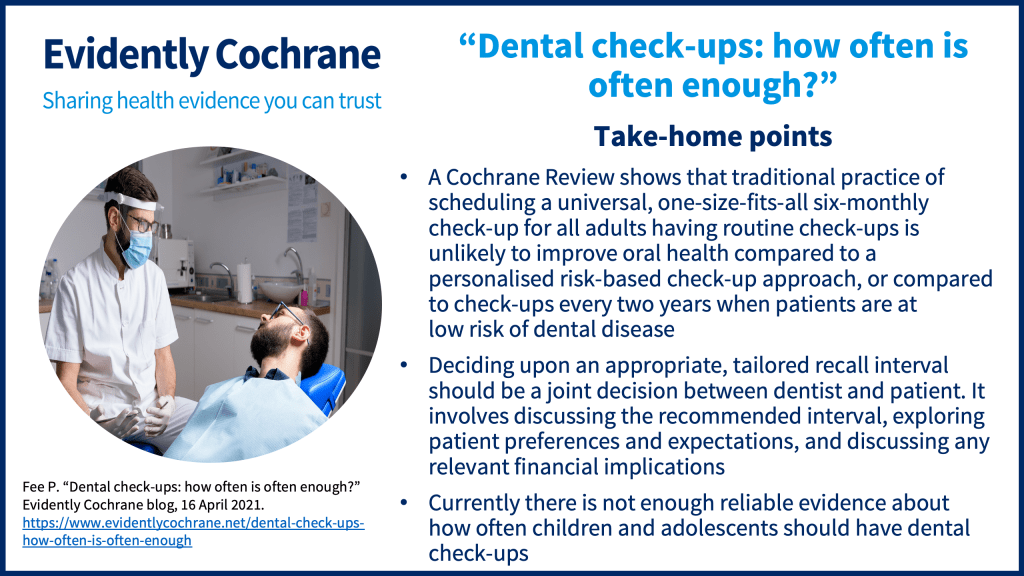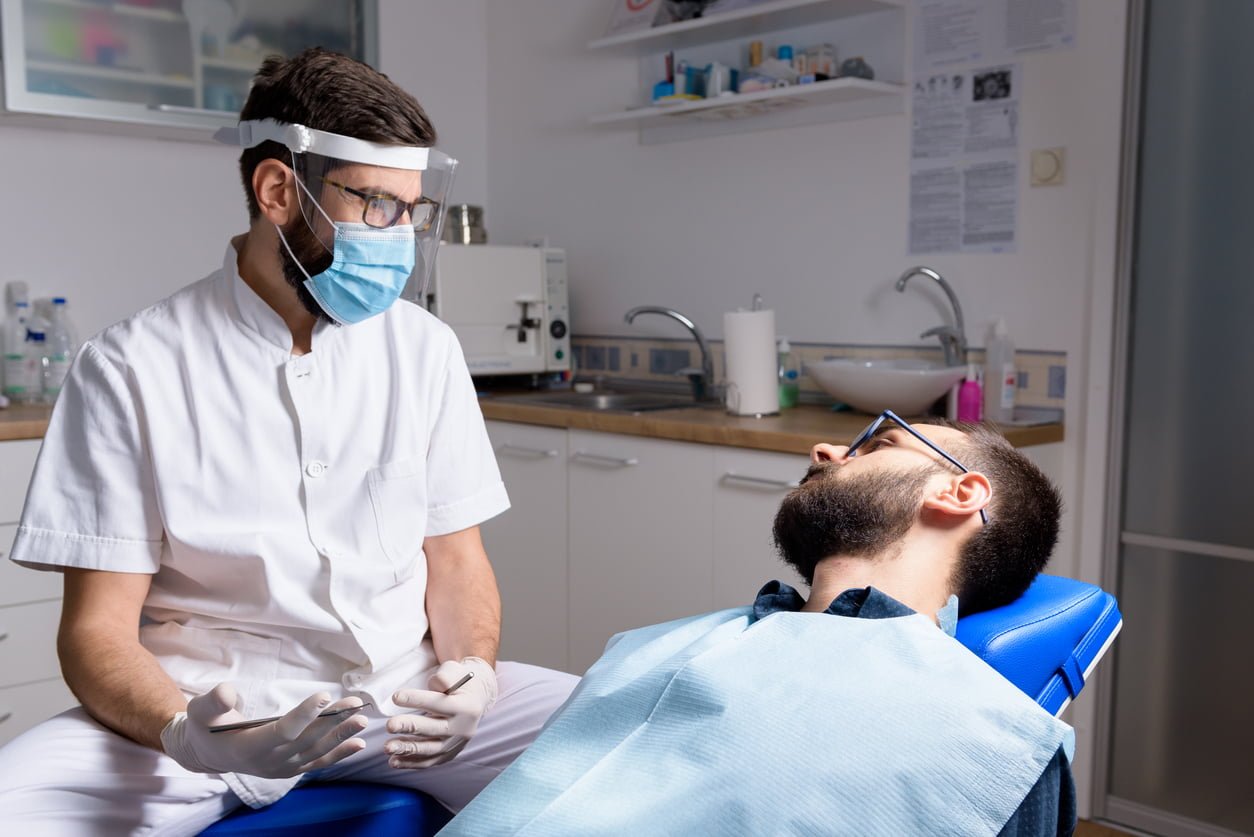Patrick Fee is a Clinical Research Fellow and Specialty Registrar in Restorative Dentistry and leading author of an updated Cochrane ReviewCochrane Reviews are systematic reviews. In systematic reviews we search for and summarize studies that answer a specific research question (e.g. is paracetamol effective and safe for treating back pain?). The studies are identified, assessed, and summarized by using a systematic and predefined approach. They inform recommendations for healthcare and research. on dental check-up frequency. In this blog for anyone wondering how often they should have a dental check-up, and primary care dentists, Patrick discusses the latest evidence and what it means in practice.
Page last checked 3 July 2023

How often to recall our patients for a check-up is perhaps the most common decision dentists make. Traditionally most adult patients are used to having a routine check-up every 6 months, regardless of an individual’s riskA way of expressing the chance of an event taking place, expressed as the number of events divided by the total number of observations or people. It can be stated as ‘the chance of falling were one in four’ (1/4 = 25%). This measure is good no matter the incidence of events i.e. common or infrequent. of oral disease (e.g. tooth decay or gum disease). The most recent UK Survey reported that 61% of adults with teeth said the usual reason they attend the dentist is for a check-up (Hill 2013).
Dental check-ups allow early detection of oral disease, in particular dental decay and gum disease, as well as checking the health of the rest of the mouth (British Dental AssociationA relationship between two characteristics, such that as one changes, the other changes in a predictable way. For example, statistics demonstrate that there is an association between smoking and lung cancer. In a positive association, one quantity increases as the other one increases (as with smoking and lung cancer). In a negative association, an increase in one quantity corresponds to a decrease in the other. Association does not necessarily mean that one thing causes the other. 2000, Conway 2002). This allows dentists to treat problems early, before decay or gum disease progress and potentially need more complex treatmentSomething done with the aim of improving health or relieving suffering. For example, medicines, surgery, psychological and physical therapies, diet and exercise changes.. Integrating the information collected as part of the check-up allows the dentist to use their clinical judgement to predict the individual’s likely risk of developing future dental disease and provide tailored advice to address specific risk factors. Preventive advice may include oral hygiene and dietary advice, and smoking cessation or alcohol-related health advice (National Institute for Health and Care Excellence 2015, Public Health England 2017).
The risk of developing dental disease varies between individuals. The National Institute for Health and Care Excellence (NICE) has therefore recommended a personalised risk-based check-up frequency since 2004. Time between check-ups would depend on an individual’s likely risk of developing dental disease, varying between three and 24 months. This recommendation is however based on low quality evidence, and despite this recommendation, encouraging patients to attend for check-ups every six months continues to be widespread.
New Cochrane evidence on how often people should visit their dentist for a checkup
The latest Cochrane Review on Recall intervals for oral health in primary care patients (published October 2020) is an update of a review last published in 2013 which found very low-certainty evidence from one studyAn investigation of a healthcare problem. There are different types of studies used to answer research questions, for example randomised controlled trials or observational studies. and a lack of evidence to support or refute the practice of six-monthly check-ups (Riley 2013).
Our updated Cochrane Review includes results from one additional UK-based study (Clarkson 2020) which provides high-certainty evidence to the review question. We included a total of 1736 people from two studies who had regular dental check-ups. One study was conducted in a public dental clinic in Norway in children and adults aged under 20 years. It compared 12-monthly and 24-monthly check-ups, and measured results after two years. The other study was in adults at 51 dental practices in the UK. It compared six-monthly, 24‑monthly and personalised risk-based check-ups and measured results after four years.
The studies looked at how different intervals between check-ups affected: the number of people with tooth decay; the number of tooth surfaces affected by decay; gum disease (percentage of bleeding sites in the gums); and quality of life (well-being) related to having healthy teeth and gums.
This review found high-certainty evidence that in adults, there was little to no difference between six-monthly and personalised risk-based check-ups in:
- the number of tooth surfaces affected by decay
- gum disease
- well-being after four years
There was also probably little to no difference in the number of people with moderate-to-extensive decay affecting at least one tooth (moderate-certainty evidence).
For adults receiving dental check-ups in primary care settings, there is high-certainty evidence that, overall, there is no difference in oral health when comparing 6-monthly and risk-based check-up frequency. In addition, there is moderate- to high-certainty evidence that there is little to no difference in oral health when comparing a 24-monthly check-up with either 6-month or risk-based check-ups over a four-year period. We concluded that further studies comparing check-up frequency for adults in primary care seem unnecessary, given the certainty of the evidenceThe certainty (or quality) of evidence is the extent to which we can be confident that what the research tells us about a particular treatment effect is likely to be accurate. Concerns about factors such as bias can reduce the certainty of the evidence. Evidence may be of high certainty; moderate certainty; low certainty or very-low certainty. Cochrane has adopted the GRADE approach (Grading of Recommendations Assessment, Development and Evaluation) for assessing certainty (or quality) of evidence. Find out more here: https://training.cochrane.org/grade-approach.
We did not find enough reliable evidence about the effects of 12-monthly and 24-monthly check-ups in children and adolescents after two years and recommend robust studies in this area.
What does this mean for adults having routine check-ups?
This Cochrane Review shows that traditional practice of scheduling a universal, one-size-fits-all six-monthly check-up for all adults having routine check-ups is unlikely to improve oral health compared to a personalised risk-based check-up approach or compared to check-ups every two years when patients are at low risk of dental disease.
These results indicate that a risk-based check-up frequency can be supported, as it does not seem to be detrimental to oral health and is acceptable to patients. But it is important to understand this evidence relates to adults having routine check-ups, not those who need to seek emergency treatment or children.
Are there other risks if people have infrequent check-ups?
One of the persistent arguments in favour of maintaining six-monthly dental check-ups is that dentists may miss the opportunity to diagnose oral cancer lesions at an early stage in patients who attend less frequently. No studies in this review reported the effect of different check-up frequencies on detecting oral cancer. The incidence of oral cancer in the UK is highest in Scotland, at 10.0 per 100,000 males (Conway 2018). However, it has been reported that 53.7% of patients diagnosed with oral cancer had not attended a dental check-up at all in the two years before diagnosis (Purkayastha 2018). It is estimated that dentists in Scotland will see a case of oral cancer once every 10-20 years – depending on the geographical location (Purkayastha 2018).
In addition, adults at higher risk of oral cancer are also at higher risk of dental decay and gum disease – people with higher alcohol intake, those who smoke, and individuals from lower socioeconomic status are at increased risk of all three diseases. A personalised risk-based check-up frequency would allow those individuals at greater risk to be seen more frequently, while healthy patients can be seen less frequently. Checking the health of the mouth is still recommended at every check-up, as is the recall of patients at high risk of dental disease and oral cancer more frequently than patients at low risk of these diseases.
The COVID-19 pandemic and dental care
This research is also valuable when considering the significant impact of the COVID-19 global pandemic and its effect on dental services worldwide, limiting patient access to dental treatment. Patient access to dental care may remain limited for some time, however the results of this review provide reassurance that intervals between check-ups can be extended beyond six months without detriment to oral health.
What is my risk of dental disease?
When weighing up an individual’s risk of developing future dental disease, a dentist will assess factors such as:
- self-performed oral hygiene habits and timing (e.g. brushing teeth, flossing)
- dietary habits – including amount and frequency of sugar intake
- fluoride use
- tobacco use
- alcohol intake
- signs of active disease
- plaque control
- quantity and quality of saliva (which helps to protect teeth against disease)
- past disease experience (which can be assessed through the number of teeth with fillings or teeth that have been previously extracted)
- medical history, including factors that may impact on oral health
Bringing this collected information together allows the dentist to use their clinical judgement to predict the individual’s likely future disease experience and recommend an appropriate tailored recall interval based on this risk assessment. This is a joint decision between dentist and patient and involves discussing the recommended interval, exploring patient preferences and expectations, and discussing any relevant financial implications.
In circumstances where there is uncertainty about an individual’s disease risk, an initial conservative recall can be extended if good oral health is maintained over time. On the other hand, previously longer recall intervals can be adjusted to account for changes in likely future disease experience (for example, if a new risk factorAn aspect of a person's condition, lifestyle or environment that affects the chance of them getting a disease. For example, cigarette smoking is a risk factor for lung cancer. is identified at check-up).
Join in the conversation on Twitter with @PatrickAFee1 @CochraneUK and @CochraneOHG or leave a comment on the blog. Comments are checked by the Editors before they are made public on the blog.
Please note, we cannot give specific medical advice and do not publish comments that link to individual pages requesting donations or to commercial sites, or appear to endorse commercial products. We welcome diverse views and encourage discussion but we ask that comments are respectful and reserve the right to not publish any we consider offensive. Cochrane UK does not fact check – or endorse – readers’ comments, including any treatments mentioned.
People who comment on our blogs often have further questions, including about the effects of treatments. If you have a question about a health claim you have heard or read (e.g. does the use of petrol pumps spread COVID-19 (coronavirus disease)?) you can submit it to iHealthFacts, a fact-checking resource.
Patrick Fee has nothing to disclose.



I am so happy you talked about how dental examinations enable for the early diagnosis of oral diseases, including tooth decay, gum disease, and overall mouth health. You said that this enables dentists to address issues before decay or gum disease worsens and perhaps requires more involved treatment. As an independent girl living alone for the first time in a city, I can barely make sense of, I feel it’s important I find a dentist I can go to for dental checkups like you said here. Thanks a lot.
Oh, okay. Thank to you, I now finally understand that twice a year is not a bad frequency at all for a personal dental checkup, provided we have normal oral condition. My nephew is wondering when should he bring his five-year-old daughter to see a dentist before she enters kindergarten next month. I’ll make sure he books an appointment on her behalf quickly so everything will be fine.
Your statement that dental exams enable early diagnosis of oral diseases, particularly dental decay and gum disease, is excellent. I’m new to the neighborhood and I’m looking for a nice dentist to take my son to this weekend. Thanks for highlighting the significance of regular dental exams and I hope to locate my son a good dentist soon.
Your blog is so interesting, Thank you for sharing your blog..
Its interesting when you said that dental check-ups allow early detection of oral disease, in particular dental decay and gum disease. I am new to my area and I am looking for a good dentist for my son. Thanks for the information on dental checkups and I hope that I can find a suitable dentist for my son soon!
One of the persistent arguments in favour of maintaining six-monthly dental check-ups is that dentists may miss the opportunity to make more money!